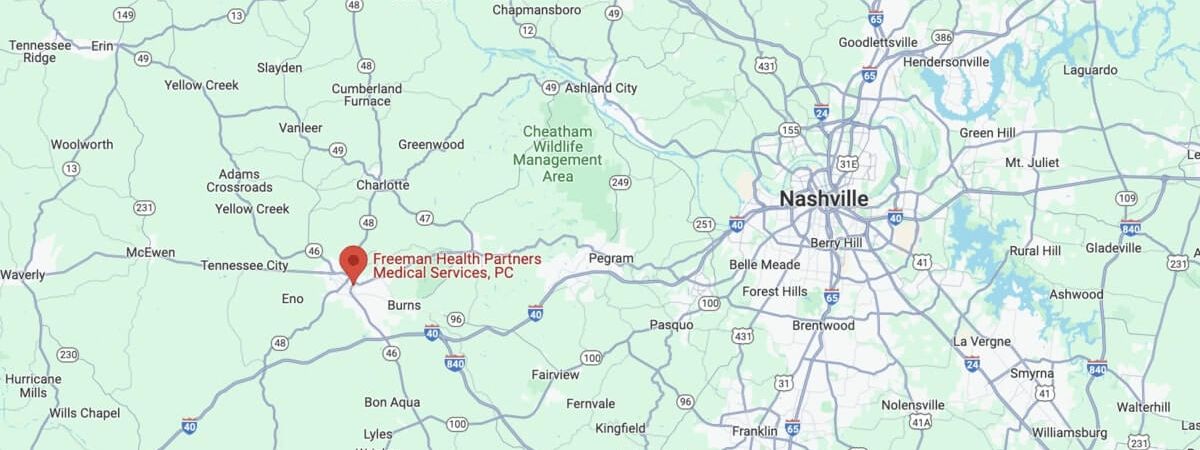Dialectical Behavioral Therapy (DBT) Treatment Center Near Nashville, Tennessee
Dialectical Behavioral Therapy (DBT)
Programs for Mental Health Treatment
Programs for Mental Health Treatment
At Freeman Health Partners, we offer comprehensive therapy programs near Nashville, Tennessee, including Dialectical Behavioral Therapy (DBT), along with primary care services across Middle Tennessee. Our holistic approach is designed to tackle a wide range of mental health challenges, providing personalized treatment options that inspire long-term well-being and recovery.
Freeman Health Partners also specialize in therapy programs for mental health conditions, dual diagnosis, and primary care needs, guaranteeing that each patient receives a well-rounded and integrated approach to both their mental and physical health. Let’s explore DBT programs in the Volunteer State below.

What is Dialectical Behavioral Therapy (DBT)?
Dialectical Behavioral Therapy (DBT) is a mindfulness-based therapy that combines cognitive-behavioral techniques with principles of dialectics. It helps you with emotional regulation, improve relationships with interpersonal effectiveness, and cope with challenging situations by building distress tolerance. Originally developed to treat borderline personality disorder, DBT has proven effective for a variety of mental health conditions, including anxiety, depression, and substance use disorders.
DBT also emphasizes self-validation and behavioral analysis to foster healthier thought patterns and behaviors. By integrating mindfulness and dialectics, DBT encourages you to find balance between acceptance and change, promoting overall mental well-being.
Statistics and Information on Dialectical Behavioral Therapy (DBT) Programs in the Nashville Area
In the Nashville area, an estimated 2,500 patients are currently utilizing Dialectical Behavioral Therapy for mental health treatment. Across Tennessee, this number rises to around 12,000 people actively engaged in DBT programs. These statistics highlight the growing recognition of DBT’s effectiveness in confronting various mental health disorders throughout the state.
Of those using DBT in Tennessee, approximately 80% are seeking treatment for mental health disorders such as borderline personality disorder, depression, and anxiety. The remaining 20% use DBT for other reasons, including managing emotional dysregulation, enhancing interpersonal relationships, and developing coping strategies for stressful situations.
Available Dialectical Behavioral Therapy (DBT) Treatment Centers Near Nashville, Tennessee
Yes, there are Dialectical Behavioral Therapy (DBT) centers available in the Volunteer State. Freeman Health Partners, based near Nashville at 222 State Street, Dickson, TN 37055, offers specialized DBT programs that address a range of mental health needs. Our center provides a comprehensive approach to treatment, focusing on evidence-based techniques to help you manage emotions and improve overall well-being.
At the Freeman Mental Health Program, we can carry out a detailed free mental health assessment and recommend custom-built treatment options that best suit your needs. We encourage you to call us at (615) 879-3582 or contact us here to book an assessment and begin your journey toward healing and recovery.

Free Mental Health Assessments
How Successful is Dialectical Behavioral Therapy (DBT) Treatment?
Dialectical Behavioral Therapy (DBT) is highly successful in treating various mental health conditions, particularly borderline personality disorder. Studies show that up to 77% of those who undergo DBT experience significant reductions in self-harm, suicidal behaviors, and emotional instability. DBT also improves interpersonal relationships and overall quality of life for many patients.
DBT services success extends beyond borderline personality disorder, proving effective in treating other conditions like depression, anxiety, and substance use disorders. Its structured approach, which combines mindfulness, emotional regulation, and distress tolerance, helps you develop lasting coping skills. As a result, many patients experience long-term improvements in their mental health and overall functioning.
What is a Dialectical Behavioral Therapy (DBT) Treatment Center?
A Dialectical Behavioral Therapy treatment center is a specialized facility providing structured programs focused on DBT principles. These centers offer comprehensive care, including individual and group therapy, designed to help you manage intense emotions, improve interpersonal relationships, and develop effective coping strategies. DBT treatment centers typically emphasize core areas such as mindfulness, emotional regulation, distress tolerance, and interpersonal effectiveness.
Tennessee, known as the Volunteer State, is an excellent location for DBT treatment centers due to its rich cultural heritage and welcoming environment. Music City (Nashville) is renowned for its country music capital status and Southern hospitality, while the Smokies offer a serene backdrop for healing. With influences like Appalachian culture, blues music, and barbecue culture, Tennessee provides a supportive and vibrant setting for mental health recovery. Additionally, the state’s history, including Civil War history landmarks and Elvis Presley’s Graceland, enriches the therapeutic experience, making Tennessee a unique and engaging place for DBT treatment.
We Accept Most Major Insurance Providers in Tennessee
At Freeman Health Partners, we understand the financial concerns that accompany the decision to seek mental health and primary care services. That’s why we’re committed to making our services as accessible as possible by accepting most major insurance providers in Tennessee. This includes Aetna, Carelon, Blue Cross Blue Shield, Cigna, and Humana.
Our goal is to ensure that everyone who needs our help can receive it, regardless of their insurance coverage. We encourage you to take the first step towards better mental health by filling out our online form. This will allow us to determine your health insurance coverage levels for mental health treatment and primary care services. By understanding what services your insurance covers, you can start your journey with confidence, knowing that you have the financial support you need.




Check Your Insurance By Phone
What Common Disorders Does Cognitive Behavioral Therapy (CBT) Treat in Nashville, TN?
Cognitive Behavioral Therapy is widely used in Nashville to treat various mental health and behavioral disorders. The following are common examples of conditions where CBT is effective, including depression, anxiety disorders, drug or alcohol addiction, mood disorders, anger problems, disordered eating, and OCD. This list highlights some of the many areas where CBT can provide support and improvement.
CBT for Depression
CBT for depression is highly effective, by helping you identify and change negative thought patterns and behaviors. Through CBT, you learn to challenge distorted thinking, develop healthier coping strategies, and set realistic goals, leading to improved mood and overall functioning. This approach promotes long-term recovery and emotional resilience.
CBT Anxiety Disorders
CBT effectively addresses anxiety disorders by helping you recognize and modify anxious thoughts and behaviors. CBT techniques, such as cognitive restructuring and exposure therapy, assist in reducing excessive worry and avoidance. You’ll learn practical skills to manage anxiety symptoms and gradually confront your fears, leading to increased confidence and reduced anxiety.
CBT Drug or Alcohol Addiction
CBT is a valuable tool in treating drug or alcohol addiction by addressing the underlying thoughts and behaviors that contribute to substance use. CBT helps you identify triggers, develop coping strategies, and change maladaptive thought patterns. This approach supports sustained recovery by encouraging healthier behaviors and reducing the risk of relapse.
CBT for Mood Disorders
Cognitive Behavioral Therapy is effective for managing mood disorders such as bipolar disorder and cyclothymia. It helps you understand and alter negative thought patterns and emotional responses. By using techniques like cognitive restructuring and behavioral activation, CBT assists in stabilizing mood, enhancing coping skills, and improving overall emotional regulation and quality of life.
CBT for Anger Problems
Cognitive Behavioral Therapy is effective in addressing anger problems by helping you recognize and alter the thought patterns and behaviors that fuel your anger. CBT techniques, such as cognitive restructuring and problem-solving, enable you to manage your emotional responses more effectively, improve communication skills, and develop healthier ways to handle anger and conflict.
CBT for Disordered Eating
CBT is highly effective for treating disordered eating by helping you identify and change harmful eating behaviors and distorted body image perceptions. Through CBT, you’ll learn to challenge negative thoughts about food and self-worth, develop healthier eating habits, and build a more positive relationship with your body, promoting long-term recovery.
CBT for OCD
Cognitive Behavioral Therapy for OCD, is a key treatment for focusing on reducing compulsive behaviors and intrusive thoughts. Techniques such as Exposure and Response Prevention (ERP) help you face your fears and resist engaging in rituals. CBT supports you in managing your symptoms, reducing the severity of OCD, and improving daily functioning.
Additionally, CBT for ADHD and CBT for PTSD are proven to be powerful solutions if you are struggling with those conditions. Set up an assessment with FHP to get started today with the admissions process.

What is DBT Used to Treat?
DBT is used to treat a range of mental health conditions, including borderline personality disorder, anxiety, depression, and substance use disorders. By incorporating dialectical thinking, self-soothing techniques, and validation principles, DBT helps you improve interpersonal communication and emotional regulation. It is often combined with schema-focused therapy to address deep-rooted cognitive patterns.
Beyond borderline personality disorder, DBT has been adapted to treat conditions involving emotional dysregulation, such as eating disorders and post-traumatic stress disorder (PTSD). Its emphasis on balancing acceptance with change makes it a versatile and effective treatment option for those struggling with complex emotional and behavioral challenges.
What Are The Components Of DBT?
What are the six main points of Dialectical Behavior Therapy (DBT)? The six key components include core mindfulness, emotion regulation skills, distress tolerance, interpersonal effectiveness, radical acceptance, and validation strategies. These elements work together to help people, especially those with borderline personality disorder, develop coping skills, improve mindful awareness, and apply behavioral therapy techniques to manage emotions and enhance relationships.
Core mindfulness emphasizes present-moment awareness, while emotion regulation skills and distress tolerance help you manage intense emotions and navigate crises. Interpersonal effectiveness strengthens relationship skills, radical acceptance encourages embracing reality, and validation strategies support self-acceptance. Together, these components form a comprehensive approach to mental health treatment.
What Is the Purpose of Using Dialectical Behavior Therapy (DBT)?
The purpose of using Dialectical Behavior Therapy (DBT) is to help individuals manage intense emotions, improve interpersonal relationships, and develop effective coping strategies. DBT aims to balance acceptance and change through various techniques. The following list includes examples of DBT strategies, though it is not an exhaustive overview.
Dialectical Strategies for Mental Health
Dialectical strategies for mental health focus on integrating acceptance and change to manage emotional challenges effectively. These strategies involve balancing opposing perspectives, such as accepting current situations while striving for improvement. By using dialectical approaches, you can navigate complex emotions, reduce self-destructive behaviors, and develop healthier ways of thinking and interacting with others.
Resilience Building via Distress Tolerance
Resilience building via distress tolerance involves developing skills to manage and endure emotional pain without resorting to harmful behaviors. By learning distress tolerance techniques, you can handle stressful situations more effectively, maintain emotional stability, and prevent crises from escalating. This approach fosters greater emotional resilience, helping you cope with challenges and maintain well-being.
Emotional Regulation Techniques
Emotional regulation techniques focus on managing and altering intense emotions to improve overall emotional well-being. These techniques include strategies like identifying and challenging negative thought patterns, practicing mindfulness, and using self-soothing methods. By learning these skills, you can better control their emotional responses, reduce mood swings, and enhance your ability to handle stress effectively.
Behavioral Approaches for Coping and Enhancing Well-Being
Behavioral approaches for coping and enhancing well-being involve modifying behaviors to improve mental health and overall quality of life. These approaches include setting achievable goals, engaging in positive activities, and developing new coping skills. By implementing these strategies, you can build healthier habits, manage stress more effectively, and enhance your overall sense of well-being.
Interpersonal Effectiveness Development
Interpersonal effectiveness development focuses on improving communication and relationship skills to nurture healthier interactions. Techniques include assertiveness training, active listening, and conflict resolution strategies. By enhancing these skills, you can build stronger relationships, manage interpersonal conflicts more effectively, and achieve better outcomes in social and professional interactions.
Mindfulness Practices in Early Career Stages
Mindfulness practices in early career stages involve techniques to enhance focus, reduce stress, and improve emotional resilience. These practices include meditation, mindful breathing, and present-moment awareness exercises. By integrating mindfulness into their routines, you can manage workplace stress more effectively, increase productivity, and build a foundation for long-term emotional and professional success.

What Are the Key Differences Between Comprehensive DBT and a DBT Skills Group?
The key differences between a comprehensive DBT and a DBT skills group are their scope and structure. Comprehensive DBT includes individual therapy, skills training, and phone coaching, providing a holistic approach to treatment. In contrast, a DBT skills group focuses solely on teaching specific skills like mindfulness and emotion regulation in a group setting.
Comprehensive DBT offers a more extensive treatment framework, integrating individual therapy with group sessions and ongoing support to address complex mental health needs. A DBT skills group, while valuable for learning and practicing skills, does not include the individualized therapeutic support and crisis management components found in comprehensive DBT programs. For DBT therapy Nashville, TN has a wide range of options, whether you are looking for a comprehensive or skills group approach.
What are the Differences Between Dialectical Behavior Therapy (DBT) and Cognitive Behavioral Therapy (CBT)?
DBT and Cognitive-Behavioral Therapy (CBT) differ in their approaches and focus. With Dialectical Behavior Therapy vs CBT, DBT incorporates mindfulness and emotional regulation strategies, emphasizing acceptance and change, while CBT focuses on identifying and altering negative thought patterns and behaviors. DBT is often used for complex emotional disorders, whereas CBT is more commonly applied to a broad range of conditions.
DBT includes components like distress tolerance and interpersonal effectiveness, which are specifically designed for managing severe emotional dysregulation. CBT, on the other hand, concentrates on cognitive restructuring and behavior modification. Both therapies are effective, but they address different aspects of mental health and are chosen based on assessment of individual needs.

What Are The Therapeutic Techniques Used in DBT to Treat Mental Health Disorders?
DBT employs several therapeutic techniques to help you manage emotions and improve mental health. Key techniques include mindfulness practices to enhance present-moment awareness, emotional regulation strategies to manage intense feelings, and distress tolerance skills to handle crises without resorting to harmful behaviors. DBT also incorporates interpersonal effectiveness training to build healthier relationships and assertive communication.
Additionally, DBT utilizes behavioral analysis to identify and modify problematic behaviors. Techniques such as radical acceptance and self-validation are central to DBT, encouraging you to accept your current reality while working towards meaningful change. These combined strategies support comprehensive emotional and behavioral management.
Does Private Health Insurance Cover DBT in Tennessee?
Yes, private health insurance often covers Dialectical Behavior Therapy (DBT) in Tennessee, including DBT therapy for young adults and DBT counseling Nashville, TN, residents can benefit from. Coverage can vary depending on the insurance plan and provider, so it’s important to check specific policy details to confirm coverage.
Many insurance plans offer coverage for mental health treatments, including DBT, but may require pre-authorization or have specific conditions. To ensure you receive the benefits, contact us at Freeman Primary Care to see whether DBT sessions are covered, and if so, understand any copays or deductibles that may apply.
How Much Does DBT Cost in the Greater Nashville Area Without Private Health Insurance?
Without private health insurance, Dialectical Behavior Therapy (DBT) in the Greater Nashville area typically costs between $100 to $250 per session. The total cost can vary depending on the therapist’s rates, session frequency, and any additional services provided, such as group sessions or consultations.
For those without insurance coverage, it’s important to consider the overall financial commitment for admissions to a complete DBT program, which may include multiple sessions per week. Some centers, like Freeman Mental Health, offer sliding scale fees or payment plans to assist with affordability. To manage costs effectively, inquire directly with DBT providers like FHP about payment options and any available financial assistance.
How Much Does DBT Cost in Middle Tennessee With Commercial Health Insurance?
The cost of Dialectical Behavior Therapy in Nashville, TN, with commercial health insurance varies based on factors like the specific insurance plan, provider rates, and coverage details. Generally, insurance may cover a portion of the costs, including therapy sessions and related services, but you may be responsible for copays, deductibles, or co-insurance.
To determine the exact out-of-pocket expense, review your insurance benefits, including any limitations or pre-authorization requirements. Contact us at Freeman Mental Health for detailed information on your coverage and financial responsibilities.
Check Your Insurance Coverage
Find out your health insurance coverage levels for by calling the number below.
- Primary Healthcare
- Mental Health Treatment
- Private Mental Health Treatment
- Anxiety Treatment
- Depression Treatment
- Medication Assisted Treatment
- Medication Management
- Mental Health Intervention
- Partial Hospitalization Program
- Psychiatric Services
- A&D Assessments
- Outpatient Program
- Therapy Programs
- CBT Programs
- DBT Programs
- TMS Programs
Information and Statistics on Dialectical Behavioral Therapy (DBT) in The Nashville Area
- According to help.org, DBT may be used to treat suicidal and other self-destructive behaviors
- NIH.gov describes the standard DBT treatment package as consisting of weekly individual therapy sessions (approximately 1 hour), a weekly group skills training session (approximately 1.5–2.5 hours), and a therapist consultation team meeting (approximately 1–2 hours
- NAMI.org: In Tennessee, 252,000 adults have a serious mental illness
- Studies have found that even shorter 8 weeks of treatment showed a significant reduction in BPD symptoms
- Dr. Marsha Linehan found that DBT resulted in significant improvements for chronically suicidal and self-injuring women
- In one study, those receiving DBT were half as likely to make a suicide attempt
- According to jaapl.org, DBT is very effective in reducing anger, impulsivity, and substance abuse

